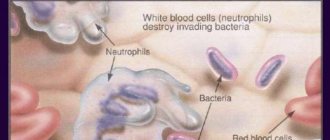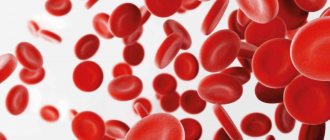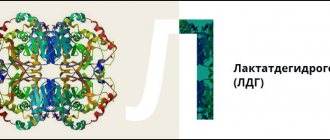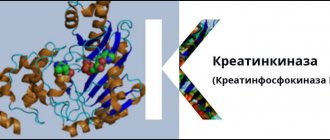There are six types of neutrophils depending on the stage of their maturation. Immature types include myeloblasts, promyelocytes, myelocytes, metamyelocytes and band cells. The final stage of development is segmented neutrophils (mature cells with a formed nucleus, divided into several segments).
Even at the stages of their initial development, neutrophils are able to resist infection, although mature segmented cells cope with this task much more effectively.
In blood tests of people suffering from severe infectious diseases, immature forms of neutrophils can be detected. This is explained by the fact that in the fight against pathogenic microorganisms, segmented cells die too quickly, and therefore the body is forced to use cells that are not fully mature. But in the blood of a healthy person, predominantly mature neutrophils are found, since they cope well with their task with virtually no help from their young brothers.
Figure 1. Phagocytosis. Image: mikrostoker/Depositphotos
Blood test for neutrophils
To determine the level of neutrophils, a complete blood count is used. To designate neutrophils on the analysis form, the Latin abbreviation NEUT is used, which can be expressed either in absolute (cell content per liter of blood, for example 0.04-0.3 × 109) or as a percentage. For general analysis, capillary blood is usually used. The biomaterial is collected from a finger after puncture with a scarifier. Sometimes blood is drawn from a vein - much depends on the methods the laboratory uses.
Indications for analysis
A general blood test is the most common hematological test, so the range of indications for its use is wide. Neutrophils are a type of white blood cell whose main task is to destroy pathogenic microorganisms. Therefore, the main goal of the analysis for the content of neutrophils is to identify potentially dangerous conditions accompanied by infectious and inflammatory processes. In other words, a blood test for neutrophils can be informative both for colds and for kidney or liver diseases.
Preparing for analysis
The study is carried out in the morning on an empty stomach, since food intake causes an increase in the number of neutrophils in the blood. Dinner on the eve of the test is allowed no later than eight o'clock in the evening. 2 days before the study, the patient should follow the following preparation rules:
- stop drinking alcohol;
- limit the consumption of spicy, fried and fatty foods;
- Avoid heavy physical activity and nervous stress.
The morning before the test you should not smoke. It is allowed to drink pure still water.
Figure 2. Preparation for donating blood for analysis.
Normal levels of neutrophils in the blood
The number of neutrophils in the blood is approximately 40-70% of the total leukocyte mass in both men and women.
When conducting research, experts primarily pay attention to the content of neutrophils at the middle and full stages of maturation, that is, band and segmented forms. Young cells are of interest if the development of the spread of inflammatory processes is suspected. The table shows the leukocyte formula, which reflects, among other things, the number of neutrophils. Table 1. Leukocyte formula with the number of neutrophils
| Index | × 10x9/l | Share as a percentage of the number of leukocytes | |
| Neutrophils | segmented | 2.0 – 5.5 | 40 — 70 |
| stab | 0.4 – 0.3 | 1 — 5 | |
| Basophils | Within 0.062 | Within 1.0 | |
| Eosinophils | 0.02 – 0.3 | 0.5 — 5 | |
| Lymphocytes | 1.0 – 3.2 | 17 — 38 | |
| Monocytes | 0.07 – 0.5 | 3 — 12 | |
In children of the first year of life, the number of band neutrophils can reach five, then the maximum value is limited to four, as in adults. The smallest number of segmented neutrophils is observed in children 4-5 years old (35-55%). In other age groups it varies between 40-70%.
For what reasons do neutrophils decrease?
Most often, neutrophils decrease due to the occurrence of an inflammatory disease, viral infection and radiation exposure. Quite often the following factors provoke the appearance of neutropenia:
- poor environmental conditions;
- use of certain medications (“Sulfanilamide”, “Analgin” and “Levomycetin”);
- inflammatory process in the body.
A reduced percentage of neutrophils is not an independent disease. This is only the result of the development of another disease, which can be identified after a thorough medical examination. If laboratory test results are unsatisfactory, you should visit a hematologist. After a thorough examination, the specialist prescribes complex therapy.
Causes of increased neutrophils in the blood
Elevated neutrophil levels can indicate a wide range of illnesses and injuries. Very often, the cause of an increase in neutrophils in the blood is infectious processes of bacterial origin, which can be either focal or generalized (spread throughout the body).
Reasons for increasing the level of neutrophils in the blood:
- upper respiratory tract infections (laryngitis, pharyngitis, sore throat);
- pneumonia;
- kidney diseases;
- diseases of the cardiovascular system;
- local purulent-inflammatory foci (abscesses, abscesses);
- viral diseases (measles, mumps, chickenpox, rubella, etc.);
- oncological diseases;
- taking hormonal medications;
- infections of bacterial origin (dysentery, tuberculosis, cholera, anthrax, etc.);
- poisoning with toxic substances;
- processes of tissue necrosis (gangrene, myocardial infarction, major burns);
- injuries of large organs;
- fractures;
- damage to the skin (cuts, abrasions, etc.);
- gout;
- sepsis (blood poisoning).
Eating canned foods can also cause an increase in neutrophils. This applies to those products in which there are no longer living bacteria left, but the toxic products of their vital activity have been preserved.
Causes of low levels of neutrophils in the blood
A decrease in the level of neutrophils in the blood is called neutropenia. The cause of this phenomenon can be diseases of various natures, as well as taking various medications.
Reasons for decreased neutrophil levels:
- infectious diseases (viral hepatitis, typhus, influenza, mononucleosis, etc.);
- autoimmune diseases (rheumatoid arthritis, systemic vasculitis, Crohn's disease, etc.);
- radiation sickness;
- blood diseases (leukemia, hemolytic and dyserythropoietic anemia).
Separate mention should be made of medications: taking them can also cause neutropenia. This is a very broad group of medications, which includes:
- NSAIDs (non-steroidal anti-inflammatory drugs: analgin, amidopyrine);
- antibacterial drugs (cephalosporins, penicillins);
- drugs to lower sugar (chlorpropamide);
- thyreostatic agents (propylthiouracil, Mercazolil);
- antimalarial drugs of synthetic origin (hydroxychloroquine);
- sulfonamides (sulfapyrazone; sulfasalazine);
- cytostatics (chlorambucil, methotrexate);
- antivirals (ganciclovir, zidovudine).
Figure 3. Blood cells in a healthy person and with neutropenia. Image: Sakurra/Depositphotos
Why are neutrophils low?
The reasons for the low level may vary. Among the main ones we can list the following:
- Viral infections (rubella, influenza, measles, hepatitis, etc.).
- Protozoal infections (toxoplasmosis, malaria, leishmaniasis).
- Rickettsial (typhoid fever).
- Some bacterial infections (typhoid fever, brucellosis, paratyphoid fever).
- Consequences of taking certain medications (analgesics, cytostatics, sulfonamides).
- Anemia (aplastic, hypoplastic).
- Agranulocytosis.
- Consequences of radiation therapy.
- Radiation exposure.
- Unfavorable environmental conditions.
- Some hereditary diseases.
- Inflammatory diseases that have acquired a generalized course.
- Hypersplenism.
- Ulcer of the duodenum and stomach.
- Anaphylactic shock.
Consequences of deviation of neutrophils from the norm
A change in the level of neutrophils in the blood is a signal from the body about the presence of inflammatory diseases, injuries or poisoning. Therefore, it is necessary to accurately determine the cause of the increase or decrease in neutrophils in order to begin treatment in time or eliminate the provoking factor. If this is not done on time, the consequences can be severe (even death). The greatest danger among possible causes is infectious diseases of a bacterial nature, as well as processes of local suppuration and necrotization (death) of tissue.
Why is leukopenia dangerous?
Side effects are common to all types of antitumor treatment, even if it is carried out according to modern standards. Most of the complications, including those associated with suppression of hematopoiesis, such as leuko- and neutropenia, develop delayed, when the patient is no longer in the hospital, but is discharged for outpatient observation.
Leukopenia is a condition characterized by a decrease in the level of leukocytes in the blood.
Leukocytes are white blood cells. One of the varieties of blood cells, along with red blood cells and platelets.
The main function of leukocytes is to protect the body from infections, foreign proteins and foreign bodies that can harm it and upset the balance of biochemical reactions.
The content of leukocytes in the blood is not constant; it changes dynamically throughout the day depending on the time of day and the functional state of the body. For example, the level of leukocytes increases not only during the presence of any inflammation in the body, but also usually increases slightly in the evening, after eating, and also after physical and emotional stress.
But we are talking about those cases when the number of leukocytes decreases.
There is always some reason for this, including this natural complication of antitumor treatment.
How to reduce the number of neutrophils in the blood
To reduce the number of neutrophils in the blood, it is necessary to influence the cause of this phenomenon, since there are no separate ways to eliminate it. If the increase in neutrophil levels is caused by short-term stress or increased physical activity, then no specific correction is required.
For persistent neutrophilia, depending on the disease that caused it, the following treatment methods are used:
- antimicrobial therapy - antibiotics are used for infections (amoxicillin, cefixime);
- antiplatelet therapy - in case of heart attack and a tendency to blood clots, acetylsalicylic acid and alteplase are prescribed;
- anti-inflammatory therapy - glucocorticosteroids (prednisolone) are used to reduce inflammation that provokes neutrophilia;
- chemotherapy – aimed at combating malignant tumors (cytostatics, antimetabolites).
If there is a local focus of inflammation, surgical treatment can be used. For example, it is relevant for appendicitis or abscesses. The menu should limit the amount of meat products, canned and smoked. The diet should be rich in vegetables and fruits.
To normalize the level of neutrophils in the blood, it is recommended to eat more vegetables and fruits. Photo: sommail / freepik.com
When you need to urgently seek help
In severe cases of neutrophil deficiency, even “native” bacteria—those that live in the healthy gastrointestinal tract or, say, on the oral mucosa—can cause serious illness. And any infection can become fatal almost instantly Neutropenia.
Contact your doctor as soon as possible or, depending on the condition, call an ambulance if, against the background of diagnosed neutropenia, you observe one, or even more so, several of the listed symptoms of Neutropenia. When to see a doctor:
- Fever. They talk about it if the temperature rises above 38 °C.
- Chills and sweating.
- An obsessive or severe cough, if it did not exist before. Another dangerous sign is an increase in an existing cough.
- Dyspnea.
- Pain in the mouth.
- A sore throat.
- Any noticeable changes in urination: pain, pain, irritation of the skin and mucous membranes, change in the color and consistency of urine.
- Diarrhea.
- Vomit.
- Redness or swelling around the slightest scratch or cut.
- Vaginal discharge that was not there before.
- Stiff neck. This sign is indicated if it hurts to turn or tilt your head or you cannot tilt it back.
- Palpable pain in any part of the body (leg, arm, abdomen, chest), if it was not there before.
How to increase the number of neutrophils in the blood
To correct neutropenia, it is necessary to identify its cause. If a decrease in neutrophil levels is caused by taking medications, you should first weigh the possible risks of a decrease in neutrophil levels with the importance of the therapeutic effect of the drugs used. In extreme cases, the drug can be replaced with an analogue that does not affect the level of neutrophils in the blood. The underlying diseases that cause neutropenia are treated with antibiotics, anti-inflammatory and antiviral drugs.
It is recommended to consume the following products:
- any meat dishes (it is important that they are all well thermally processed);
- hard boiled eggs;
- pasteurized milk;
- cheese (except for varieties with mold);
- potato;
- rice;
- pasta;
- fruits and vegetables;
- alcohol only in consultation with a doctor.
Careful heat treatment of meat and eggs is necessary in order to exclude the possibility of bacteria and microbes entering the body, which actively multiply in poorly fried or undercooked protein dishes.
How to increase neutrophils in the blood
When a person has a low percentage of neutrophils, it is necessary to eliminate the problem that caused this condition. If this happened due to an infectious disease, then they recover on their own in a short period of time. In other circumstances, the only way to increase neutrophils in the blood of a child or adult is to eliminate the root cause of their decrease. The doctor may prescribe drug therapy, which is relevant for severe neutropenia. If the disease manifests itself moderately, then:
- leukopoiesis stimulants are prescribed;
- The use of Pentoxyl and Methyluracil is considered effective.
Therapy should be carried out after consultation with an immunologist under the supervision of an immunogram. When the body does not respond to treatment and white blood cells are still low, colony-stimulating factor medications are prescribed, for example, Lenograsti, Filgrastim. These same medications are immediately prescribed to patients with agranulocytosis. Such drugs are prescribed only under conditions of inpatient treatment, because this is a potent group of drugs.
Find out what the norm of leukocytes in the blood of women should be.










